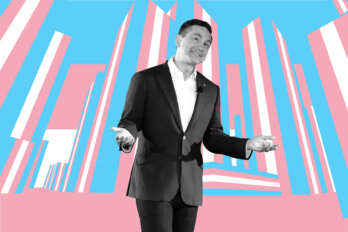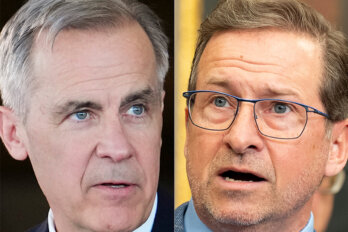In our anxious age, a young German-born political scientist, Yascha Mounk, has emerged as one of the most astute chroniclers of populism. A major focus of Mounk’s work is “illiberal democracy,” his shorthand for those backsliding nations whose bellicose leaders have played into popular anger, allowing for the trampling of minority rights. An academic and pundit, Mounk has, in recent years, documented the deep structural forces that produced the likes of Donald Trump, Viktor Orbán, and Boris Johnson. His thesis: the once-dominant liberal consensus (i.e., rule of law; individual rights; freedom of speech, press, and worship; etc.) is being squeezed in an epic clash between individual rights and the anger unleashed by authoritarian strongmen.
Mounk, who teaches at Johns Hopkins and writes for The Atlantic, has meticulously explained how we got to this point, and the story, as he tells it, has been long in the making. In his popular 2018 book, The People vs. Democracy: Why Our Freedom Is in Danger and How to Save It, he unpacks some troubling decades-long trends. Many seemingly stable liberal democracies have seen the rise of both far-right and far-left populist parties whose frontmen claim to represent the will of the people while promising simple solutions to complex problems. The centre, to paraphrase W. B. Yeats’s oft-cited lament about the years after the First World War, isn’t holding.
This centrifugal dynamic, in some European countries, has polarized electorates and kicked the supports out from under mainstream centre-left and centre-right parties, as is most recently seen in the post-Brexit civil war in the British Tory party. Mounk’s research further shows, alarmingly, that younger generations in America view authoritarianism more favourably than their forebears. Additionally, as far back as 2011, he notes, one in six Americans reported that they preferred a system of military rule—a figure that puts the US in league with authoritarian countries with histories of civic unrest, like Algeria.
As well, Mounk observes that frustration with implacable bureaucracies—a frustration that, I’d argue, is vividly expressed in the Brexiteers’ disdain for the European Union and Fox News’ drum-thumping about the “deep state”—hints at the problem of elected officials becoming eclipsed by complex regulatory systems. “Liberalism and democracy do not go together nearly as naturally as most citizens—and many scholars—have assumed,” he wrote in his book. “As the popular will increasingly clashes with individual rights, liberal democracy is splitting into its component parts.”
This age, Mounk concludes, is defined by “radical uncertainty.” “The range of possible outcomes is much wider now than it seemed to be a few years ago.” Case in point, again from Britain: Johnson’s decision to prorogue Parliament, in September 2019, in order to ram through his no-deal Brexit pledge. (The British high court ruled that this gambit was illegal and overturned the prorogue.) As Mounk observed recently in The Atlantic, “It is the most blatant assault on democracy in Britain’s living memory, and one of the most serious any Western country has faced in this populist era.”
In the midst of Canada’s own depressing election campaign, the hovering question is whether we, too, are susceptible to these revanchist forces. Are we really the steadfastly progressive bastion that a pre–brownface scandal Justin Trudeau boasted about on global stages? Are we outliers from the populist drift evident elsewhere? Or is the Canadian hinterland actually astir with latent populist or anti-immigrant anger merely waiting for a mouthpiece and a stray spark?
When I interviewed Mounk, last year, he’d just swung through Toronto, speaking after Doug Ford’s election. “There would be a danger in Canada in thinking that there’s something special in its set of cultural understandings that protects [against] rising populism,” he cautioned. While anti-immigrant rhetoric is often a hallmark of populism, it is not a requirement, Mounk added, noting Ford’s popularity in suburban Toronto ridings with large newcomer communities. Ford’s populism, Mounk concluded, is easily seen in his claims that he alone speaks for “the people”—part of the very definition of populism.
Ford, of course, isn’t the only premier playing the populist card these days. Alberta’s new premier, Jason Kenney, won by positioning himself as angry and tough, with more than a suggestion of intolerance (e.g., his attacks on gay-straight alliance clubs in schools). François Legault won last year’s Quebec election campaigning on an explicitly racist agenda, which he’s now busy implementing (e.g., legislation that prevents individuals from wearing any religious symbols in certain public contexts).
The federal politician aiming to capitalize most explicitly on the presumed welling up of populist anger is, of course, Maxime Bernier, who inveighs against “open borders” policies, climate change “alarmism,” and other crimes of political correctness. His support, however, has been stalled in the low single digits since he founded his People’s Party a year ago, and the chances of a Bernier victory in October seem microscopic. While he’s angling to open up a gash in the hull of the HMCS Scheer, there’s little to indicate that right-of-centre voters are decamping in significant numbers. So it falls to the Conservatives to do what Ford and Harper have done in elections past: placate the far right with targeted gestures while cleaving to a program that is mostly about fiscal, rather than social, conservatism.
Interestingly, the variegated public response to Trudeau’s brownface debacle offered little evidence of a major populist backlash against our famously woke prime minister or his big-tent party. Urban progressives were, perhaps predictably, appalled. Conservatives, equally predictably, denounced Trudeau’s hypocrisy, and likely breathed a sigh of relief that the Liberals’ most effective cudgel—accusations of homophobia or racist dalliances launched in the direction of Tory candidates—will be mainly sheathed for the balance of the race. As for immigrants and visible minorities living in Canada’s large urban centres: some (at least, according to media accounts, callers to phone-in shows and recent polls) seemed prepared to accept Trudeau’s apologia and focus on other issues, like climate change and the economy.
Canadian populism has deep roots and extends across the ideological spectrum, from Tommy Douglas’ Co-operative Commonwealth Federation (the precursor to the New Democratic Party) to Preston Manning’s Reform Party (ancestor of the Conservative Party of Canada). Yet, if populism is about weaponizing the masses and speaking over the heads of the elites, then Jean Chrétien, the feisty three-time Liberal prime minister from small-town Quebec, may have been its most accomplished practitioner in recent memory. The eighteenth of nineteen siblings, he described himself throughout his career, self-effacingly, as “le petit gars” from Shawinigan despite spending almost four decades in Ottawa’s halls of power.
Harper, for his part, ran a sharply right-of-centre government and had a habit of ignoring statistics, experts, and scientific research in order to pursue his agenda. But, in terms of style, the former prime minister was cold, media-shy, and hardly a rabble-rouser. He never came across as “one of the people” and looked especially uncomfortable in the obligatory Calgary Stampede cowboy gear even though he represented an oil-patch riding. And, when he ordered his government’s most conspicuously populist move—stoking anti-Muslim sentiment in the Conservative base with ill-advised stunts like the “barbaric cultural practices” hotline—voters in the immigrant-rich suburbs of Toronto abandoned the party in favour of Trudeau’s sunny ways. As social-values research conducted by the Environics Institute has shown, compared to the US, Canadians have more countervailing anti-authoritarian values—embracing open, flexible sensibilities that may serve as a check on authoritarian impulses.
Yet Mounk cautions that far-right populism can appear with surprising speed—like a stubborn virus that digs into the body politic and continues to re-surface. “Populists,” he wrote, last year, in Slate, on the subject of Ford’s victory, “are incredibly adept at surviving in office despite disappointments; at handing the reins of power over to political friends or blood relatives; and at infecting the political system with populist energy even if their own movement gradually fades.” He noted how Doug Ford, in his 2018 drive to become premier, capitalized on the brand (straight-talking, lumpen, careful with taxpayer’s money, etc.) deployed so effectively during the early years of his late brother Rob’s mayoralty. “Even when things go wrong,” Mounk says, “populism does not implode: It just hibernates.”
For that reason, he advises, it isn’t enough for defenders of liberal democracy to be permanently vigilant. They must also pursue a set of strategic goals: maintain a unified front in the face of populist insurgents; speak the language of “ordinary” people; and focus on positive messages. Mounk’s more trenchant insight, however, is that the “democratic energy” behind populist movements should be read not just as rage and hate but also as a presumably more benign desire for reform and accountability. “Defenders of liberal democracy,” he writes, “must demonstrate that they take the problems voters face seriously, and seek to effect real change.”
In some ways, Mounk’s counsel has the feel of a progressive lecturing progressives on how to be more successful in their progressivism. In Canada, one need only think back to Michael Ignatieff’s disastrous tenure as Liberal leader to be reminded that smart political scientists don’t necessarily make smart politicians. (To be clear: there’s no evidence that Mounk intends to make the leap into politics.)
That said, his assessments are worth heeding given the political turmoil of the past few years. The tag team of pollster Frank Graves, who runs Ekos, and Massey College Senior Fellow Michael Valpy, a former Globe and Mail columnist, has been warning for over a year that Canada is ripe for an outbreak of reactionary politics because the elites are blind or deaf to the simmering frustration of Canadians who balk at the complexity of cosmopolitan Canada.
“They have embraced the notion that Canada is somehow immune to what’s happening in Europe and America,” the pair wrote earlier this year, adding, in another article, that “our populist explosion has already had its first bangs and is likely to have a major impact on next year’s federal election.” Bernier’s People’s Party wants to tap into whatever Graves and Valpy have detected. But the question is whether his brand of far-right, libertarian-inflected bluster is something to fear or, as this week’s leader’s debate attested, something to mock for its absurdity.
In fact, I’d argue that Trudeau’s humiliation and the complex reaction to it from both the public and media—a confection of progressive reproach, conservative gloating, and centrist absolution—may have turned out to be the best defence against a populist surge. After all, the episode disabled the Liberals’ hit jobs on the Tories, surfaced all the latent racism directed at NDP leader Jagmeet Singh, and left in its wake a franker election as opposed to one commandeered by bombast or fear-mongering.
The mushy Canadian centre, in other words, seems to be holding, which remains the best way to keep the populists at bay.




